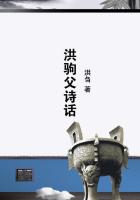"At any rate," he said in a broad Scotch accent, "ye come of kin that has helpit my maister afore this.I've many times heard tell o' Herveys and Townshends in England, and a' folk said they were on the richt side.Ye're maybe no a freend, but ye're a freend's freend, or I wadna be speirin' at ye."I was amused at the prologue, and waited on the tale.It soon came.Oliphant, it appeared, was the purse-bearer of the household, and woeful straits that poor purse-bearer must have been often put to.I questioned him as to his master's revenues, but could get no clear answer.There were payments due next month in Florence which would solve the difficulties for the winter, but in the meantime expenditure had beaten income.Travelling had cost much, and the Count must have his small comforts.The result in plain words was that Oliphant had not the wherewithal to frank the company to Florence; indeed, I doubted if he could have paid the reckoning in Santa Chiara.A loan was therefore sought from a friend's friend, meaning myself.
I was very really embarrassed.Not that I would not have given willingly, for I had ample resources at the moment and was mightily concerned about the sad household.But I knew that the little Duchess would take Oliphant's ears from his head if she guessed that he had dared to borrow from me, and that, if I lent, her back would for ever be turned against me.And yet, what would follow on my refusal? In a day of two there would be a pitiful scene with mine host, and as like as not some of their baggage detained as security for payment.I did not love the task of conspiring behind the lady's back, but if it could be contrived 'twas indubitably the kindest course.I glared sternly at Oliphant, who met me with his pathetic, dog-like eyes.
"You know that your mistress would never consent to the request you have made of me?""I ken," he said humbly."But payin' is my job, and I simply havena the siller.It's no the first time it has happened, and it's a sair trial for them both to be flung out o' doors by a foreign hostler because they canna meet his charges.But, sir, if ye can lend to me, ye may be certain that her leddyship will never, hear a word o't.Puir thing, she takes nae thocht o'
where the siller comes frae, ony mair than the lilies o' the field."I became a conspirator."You swear, Oliphant, by all you hold sacred, to breathe nothing of this to your mistress, and if she should suspect, to lie like a Privy Councillor?"A flicker of a smile crossed his face."I'll lee like a Scotch packman, and the Father o' lees could do nae mair.You need have no fear for your siller, sir.I've aye repaid when I borrowed, though you may have to wait a bittock." And the strange fellow strolled off.
At dinner no Duchess appeared till long after the appointed hour, nor was there any sign of Oliphant.When she came at last with Cristine, her eyes looked as if she had been crying, and she greeted me with remote courtesy.My first thought was that Oliphant had revealed the matter of the loan, but presently Ifound that the lady's trouble was far different.Her father, it seemed, was ill again with his old complaint.What that was Idid not ask, nor did the Duchess reveal it.
We spoke in French, for I had discovered that this was her favourite speech.There was no Oliphant to wait on us, and the inn servants were always about, so it was well to have a tongue they did not comprehend.The lady was distracted and sad.When I inquired feelingly as to the general condition of her father's health she parried the question, and when I offered my services she disregarded my words.It was in truth a doleful meal, while the faded Cristine sat like a sphinx staring into vacancy.Ispoke of England and of her friends, of Paris and Versailles, of Avignon where she had spent some years, and of the amenities of Florence, which she considered her home.But it was like talking to a nunnery door.I got nothing but "It is indeed true, sir,"or "Do you say so, sir!" till my energy began to sink.Madame perceived my discomfort, and, as she rose, murmured an apology.
"Pray forgive my distraction, but I am poor company when my father is ill.I have a foolish mind, easily frightened.Nay, nay!" she went on when I again offered help, "the illness is trifling.It will pass off by to-morrow, or at the latest the next day.Only I had looked forward to some ease at Santa Chiara, and the promise is belied."As it chanced that evening, returning to the inn, I passed by the north side where the windows of the Count's room looked over a little flower-garden abutting on the courtyard.The dusk was falling, and a lamp had been lit which gave a glimpse into the interior.The sick man was standing by the window, his figure flung into relief by the lamplight.If he was sick, his sickness was of a curious type.His face was ruddy, his eye wild, and, his wig being off, his scanty hair stood up oddly round his head.
He seemed to be singing, but I could not catch the sound through the shut casement.Another figure in the room, probably Oliphant, laid a hand on the Count's shoulder, drew him from the window, and closed the shutter.
It needed only the recollection of stories which were the property of all Europe to reach a conclusion on the gentleman's illness.The legitimate King of England was very drunk.
As I went to my room that night I passed the Count's door.There stood Oliphant as sentry, more grim and haggard than ever, and Ithought that his eye met mine with a certain intelligence.From inside the room came a great racket.There was the sound of glasses falling, then a string of oaths, English, French, and for all I know, Irish, rapped out in a loud drunken voice.A pause, and then came the sound of maudlin singing.It pursued me along the gallery, an old childish song, delivered as if 'twere a pot-house catch-"Qu'est-ce qui passe ici si tard, Compagnons de la Marjolaine---"One of the late-going company of the Marjolaine hastened to bed.
This king in exile, with his melancholy daughter, was becoming too much for him.















